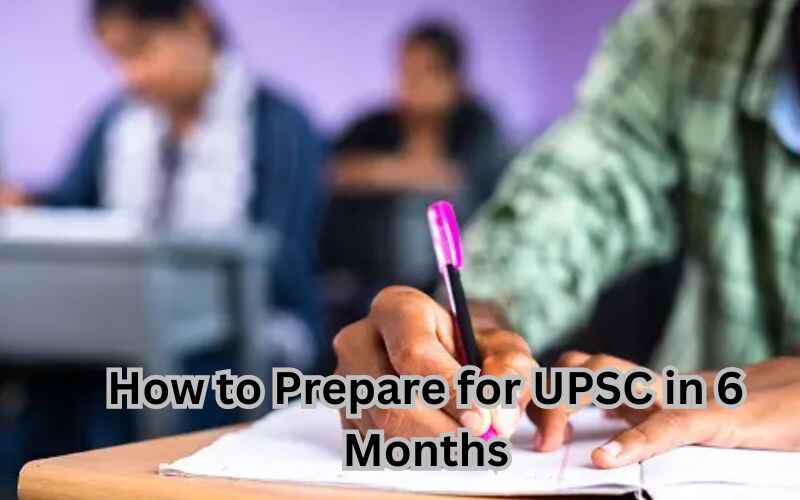Preparing for the UPSC Civil Services Examination in six months might seem like an uphill task, but with a focused strategy and disciplined execution, it is entirely achievable. Time constraints mean there’s little room for error, so a structured and efficient approach is essential. Here’s how you can navigate the path to success in just half a year.
Understanding the Challenge
The UPSC Civil Services Examination is one of the toughest exams in India, consisting of three stages:
- Preliminary Examination (Prelims): Objective tests covering General Studies (GS) and Civil Services Aptitude Test (CSAT).
- Main Examination (Mains): Nine descriptive papers, including four General Studies papers, two optional subject papers, an essay, and two qualifying language papers.
- Personality Test (Interview): A test of your personality, communication skills, and decision-making ability.
In six months, balancing the preparation for Prelims, Mains, and the interview requires laser-sharp focus and dedication.
Breaking Down the Six-Month Plan
Month 1: Laying the Foundation
- Understand the Syllabus: The UPSC syllabus is your bible. Break it down into manageable segments and align them with a timetable.
- Analyze Previous Papers: Look at the last 5-10 years of question papers. Identify important topics and the nature of questions asked.
- Focus on NCERTs: Begin with NCERT textbooks, as they provide a strong conceptual foundation. Prioritize subjects like History, Geography, Polity, and Economy.
Months 2-4: Intensive Preparation
- Consolidate General Studies: Cover the major GS subjects (History, Polity, Economy, Geography, Environment, Science & Technology) in depth. Stick to standard reference books such as Laxmikanth for Polity and Spectrum for Modern History.
- Integrate Current Affairs: Make daily newspaper reading a habit. Use trusted sources like The Hindu or Indian Express. Create concise notes focusing on governance, international relations, and socio-economic issues.
- Choose and Begin Optional Subject: Select an optional subject based on your academic background, interest, and scoring trends. Cover its basics and start practicing answer writing.
- Revise Regularly: Revise weekly to reinforce what you’ve studied and avoid information overload.
Months 5-6: Practice and Polishing
- Focus on Prelims: Shift your focus to Prelims preparation. Solve mock tests and analyze your performance. Emphasize speed and accuracy.
- Enhance Answer Writing Skills: Practice writing Mains answers daily. Focus on structuring answers well and incorporating relevant facts and examples.
- Master Essay Writing: Practice essays on diverse topics, combining analytical thinking with clear articulation.
- Revise Key Areas: Revise static topics and current affairs intensively. Use mind maps and flashcards for quick reviews.
The Role of Time Management
Time management is pivotal in a six-month preparation strategy. Allocate hours wisely, balancing subject coverage, revision, and mock tests. A typical day could include:
- Morning: Current affairs and revision.
- Afternoon: Core subjects (GS or Optional).
- Evening: Practice tests or answer writing.
- Night: Optional subject or essay practice.
Ensure consistency by maintaining a fixed schedule and tracking your progress regularly.
Tools and Resources for Success
Books and Materials
- General Studies:
- History: Spectrum and NCERTs.
- Polity: Indian Polity by Laxmikanth.
- Economy: Sriram IAS Notes or Ramesh Singh.
- Geography: NCERTs and GC Leong.
- Environment: Shankar IAS Book.
- Current Affairs:
- Newspapers: The Hindu, Indian Express.
- Magazines: Yojana, Kurukshetra, and EPW.
- Government reports and press releases.
Online Resources
- Enroll in online courses or test series.
- Follow reliable YouTube channels for crisp topic explanations.
- Use apps for flashcards, current affairs, and time management.
Leveraging Mock Tests
Mock tests are essential for both Prelims and Mains. For Prelims, they help improve accuracy and time management. For Mains, mock tests refine your answer-writing skills. Regularly analyze your test performance to identify weak areas and address them effectively.
The Importance of Current Affairs
Given the dynamic nature of the UPSC exam, current affairs play a crucial role. Regularly link news events with static syllabus topics. For instance:
- A new government policy can be tied to Polity and Economy.
- A natural disaster can be linked to Geography and Environment.
Staying Motivated and Overcoming Challenges
Six months of rigorous preparation can be mentally taxing. To stay motivated:
- Set short-term goals and reward yourself for achieving them.
- Surround yourself with supportive peers or mentors.
- Incorporate exercise and meditation to maintain physical and mental well-being.
Overcome challenges by adopting a problem-solving mindset. For example:
- If a topic feels overwhelming, break it into smaller parts and tackle them gradually.
- Struggling with time? Identify distractions and eliminate them.
Avoiding Common Mistakes
- Neglecting NCERTs: Skipping NCERTs can leave gaps in foundational knowledge.
- Overloading Resources: Stick to a limited number of high-quality books and revise them thoroughly.
- Ignoring Practice: Answer writing and mock tests are as crucial as studying.
- Underestimating Current Affairs: Regularly update your notes and revise them.
The Final Lap: Last-Month Strategy
In the final month:
- Focus on revision, especially high-priority topics.
- Attempt full-length mock tests to simulate the exam experience.
- Refine essay-writing skills and practice framing answers to probable questions.
For Prelims, focus on factual clarity and elimination techniques. For Mains, emphasize analytical skills and balanced perspectives.
Wrapping Up: The Six-Month Success Formula
Preparing for upsc in 6 months might seem like a short time to prepare for an exam as challenging as UPSC, but with determination and a solid plan, you can make the most of it. The key lies in consistent effort, strategic planning, and maintaining focus on the end goal.
Remember, the UPSC exam is as much about perseverance as it is about knowledge. By following this structured approach, you can rise to the challenge and secure your dream of becoming a civil servant. Good luck!




Be First to Comment